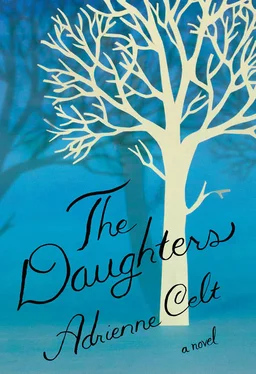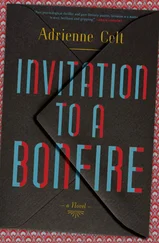But I know my mother. She’s the one who taught me the phrase Christ of Nations . She’s the one who taught me about war and invasion. Every story I ever heard from my baba Ada about Greta, I heard again from my mother Sara another way. For one thing, what Ada called our family’s gift, Sara assured me was a curse. My childhood was different in her eyes, and her mouth.
“Was there really a piano factory?”
During the years of Ada’s lessons and excursions — to the Green Mill, to the beach — I also sat on my mother’s wine-colored Turkish rug and braided the fringe. It was my secret responsibility: if left unbrushed, unbraided, unattended, the fringe collected weeks of dirt and dust. Once I ran my fingers through it and a beige spider trundled up from the tangle of scratchy strings and hurried over the back of my hand before disappearing again under Sara’s bed.
My mother didn’t leave until I was nine, and that gave me plenty of time to grow accustomed to laying my head against her knees in the early afternoon; to being the silent partner squeezing her hand as she talked and cackled into the phone; to giving my opinion on the shoes and jewelry she chose to highlight the flecks of gold in her dark eyes. I liked to listen to her talk about Greta too — not as an authority, like Baba Ada, but as another aficionado. Her versions of Greta’s stories gave me a shiver of frightened pleasure. They’d been drained of one type of blood and infused with another.
One November day, she lay on her stomach in bed with light streaming in through the long scarves she’d fashioned into curtains. I was seven. The cup of tea I’d carried in as currency sat on the squat cherrywood table beside her, a red lip print glazing the edge of the secondhand china. When I knocked on my mother’s door, I was obliged to wait, sometimes to give her the opportunity to touch up her makeup before allowing me entrance, sometimes so she could tell me to go away.
“Of course there was a piano factory.” Sara frowned at me, as if I’d gone a bit too far. “You can still buy those pianos. They’re antiques now. But good ones — like a Stradivarius.”
“Why don’t we have one?”
She laughed at me.
“Because they’re expensive, dummy. Like a Stradivarius.”
“I know a Strad is expensive.” I did know this, vaguely, from Ada and from trips to the library. I called it a Strad with tired self-importance, thinking that was the right way for a musician to speak. “I was just asking. I could take lessons. I could learn sight reading.”
Sara reached a lazy hand out to the table and picked up her teacup. She sipped it and grimaced — as usual my tea was too strong for her — and then drained half the cup so quickly it could scarcely have brushed her tongue.
“You don’t need sight reading. Good lord. You need a childhood.”
I loosened the fringe braid I’d been working on and combed the strands neat.
“I need sight reading to be adaptable .”
“Whatever you say.” Sara stretched out her fingers and regarded the polish. “What were we talking about? How did we get on this subject?”
“The piano factory,” I said. “In Poland.”
“Oh, that’s right. The fucking piano fabryka .” My mother’s use of Polish in my presence was haphazard at best and expletive at worst. If it had been up to her, I’d only ever have learned the terms she used in public to mask my need for a toilet: dupa, siusiu . But she loved storytelling every bit as much as Baba Ada. She was compelled by it, telling with inventive precision even the tales she claimed to regret ever having known. “Where Greta the Great sold her soul.”
I looked at her uncertainly.
“To the devil?”
“Sure,” said Sara. “If that’s how you want to put it.”
My mother described Greta’s world to me in a way that felt familiar but askew. The orange foxes there did not whisper messages, and the boys — Andrzej, Fil, and Konrad — only went with their father into the woods to learn the basics of his trade. But there was still the feeling of something unseen lingering beneath the surface of everyday life, a coded danger. Perhaps there were dark messages written in the trees? On one side of town was an area that Ada had never mentioned, with a synagogue. If I’d asked, Baba Ada would probably have said that those people were irrelevant to her because they didn’t come to church and hear her sing. Their children didn’t compete with her for solos in the choir. Sara had her own thoughts on the subject.
The buildings in town stood close together, like men lined up side by side so their shoulders hunched up slightly towards their ears. At ground level, slabs of window glass glinted before stacks of brightly colored cans, dress dummies swathed in wool, and posters extolling aperitifs and local pilsner. The skin of the world was composed of cobblestones and careful storefront displays, its spirit written in gossip and hunger. There was a broad plaza next to a railroad track. Naked rabbits hung upside-down in the window of the butcher’s shop, ruby red like lipstick.
On the village outskirts, where Greta and Saul lived, a person could get by on their wits — that is, their wits, a small farm, and a gun. For a house in town, however, or even a small flat above the shops, one had to be willing to give his time away for money. Some people owned the shops themselves and lived in slender buildings along with their bolts of cloth or tack and feed or even mortuary tools. There was also a fruit processing plant to which blue-suited workers walked each morning. One could recognize them from the sweet gummy stains on their clothing and from the way their wrists swelled up to the size of persimmons after ten-hour days fixing lids onto jars.
But the jewel of the town was the piano factory.
The fabryka Łozina sat on a hill above the streets and always had an aura of pitch about it: the place stank beautifully with the blood of trees. Men walked out after a long day’s work laughing, sometimes singing, with grit adhering to their shoes. They picked sticky slivers off their shirts as they unrolled the cuffs and descended home into the warm light of the town.
Saul was a woodsman. He understood the weight, the grain, the flexibility of different types of wood with the instinctual ease most people use to differentiate wholesome milk from sour. By placing his palm on a tree trunk, he gauged its usefulness in building a home, carving the headboard for a bed, or amplifying keystrokes — housing hammers and wire. Łozina instruments were of the highest quality, meant to accompany symphony orchestras across Europe and teach young aristocrats the value of perfection. And although he was not officially employed by the factory — Saul liked to keep his own hours and his options open — Greta’s husband was sought after by the buyers there because he brought them the best lumber, simple as that.
Was it the house of the devil? Was it full of fire and brimstone, I wanted to know?
“Don’t be so stupid,” my mother said. “Do you really believe everything that woman tells you?”
I frowned. “Don’t you?”
Sara brushed the question aside.
“Here’s what was inside the factory.” She waved a hand out past her head, nearly toppling her teacup and a jam jar full of makeup brushes. “A handsome man.”
“Saul?”
“No,” she said. “Not Saul. He couldn’t give Greta a daughter, remember? He didn’t have what she needed.”
This was something I’d always wondered about but had been afraid to ask Baba Ada. She was so fervent in her tales of Greta’s encounter with the devil in the forest that even my heart didn’t dare question their reality. But I was curious anyway. I wanted to understand the stories from every angle, until I could close my eyes and sculpt them with my own hands.
Читать дальше












